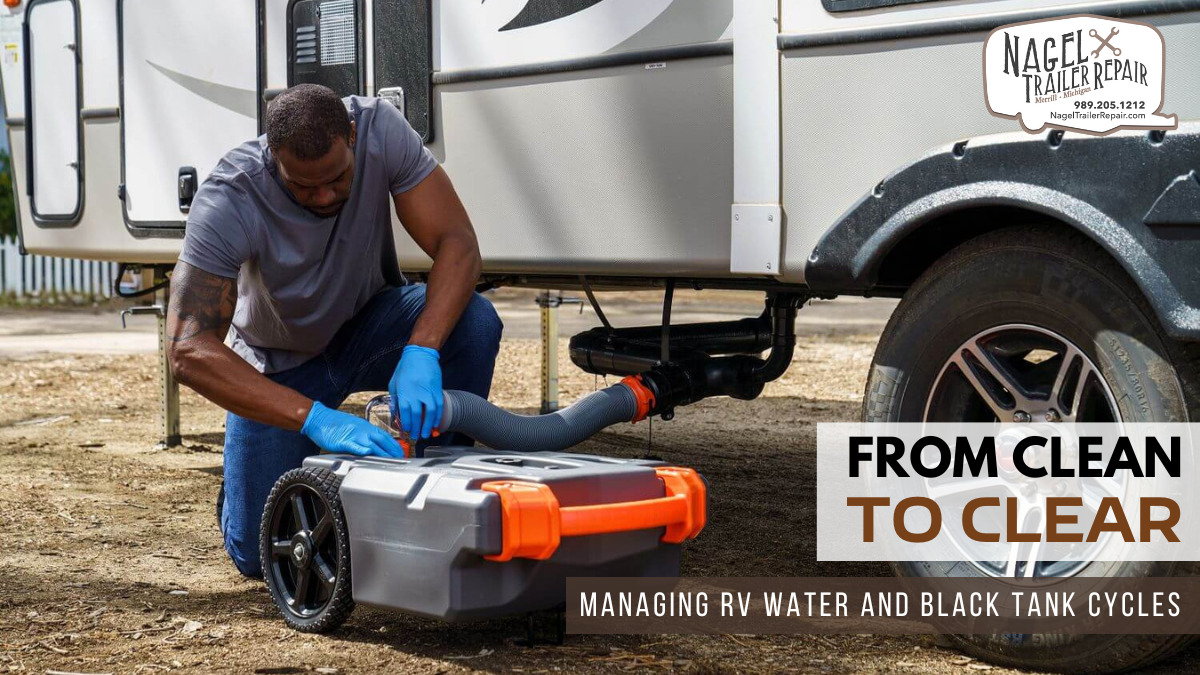Recreational vehicles (RVs) offer the freedom to explore the open road without sacrificing the comforts of home. However, maintaining a smooth-running RV involves understanding and managing crucial systems, especially those related to water and waste disposal. Among the most critical aspects are the water system and the black tank, both of which require careful attention to ensure a seamless and hygienic journey.
Understanding Your RV Water System
The RV water system is a network of components that supply, store, and distribute water throughout your vehicle. It comprises a freshwater tank, a water pump, faucets, a water heater, and sometimes a filtration system. Proper maintenance of this system is essential to ensure a clean and reliable water supply during your travels.
1. Regular Inspection and Cleaning
Begin by conducting routine inspections of your RV's water system. Check for leaks, damaged hoses, or corroded connections that could lead to water wastage or contamination. Regularly clean the freshwater tank and sanitize it according to the manufacturer's instructions to prevent the buildup of bacteria or algae.
2. Water Quality Management
The quality of the water you use in your RV significantly impacts your overall experience. Consider using a water filtration system or carrying bottled water for drinking purposes to ensure the water you consume is clean and safe. Additionally, using RV-specific water hoses and connectors designed for potable water will minimize the risk of contamination.
3. Winterization and De-Winterization
If you live in colder climates or plan to store your RV during winter, it's crucial to properly winterize your water system to prevent freezing and damage. This involves draining all water from the tanks, pipes, and appliances and adding antifreeze to prevent residual water from freezing. When the season changes, de-winterize your system by flushing out the antifreeze and sanitizing the freshwater tank before use.
Managing the Black Tank
The black tank in an RV is where all the wastewater from the toilet is stored. Effectively managing the black tank is crucial for maintaining hygiene, preventing odors, and ensuring hassle-free waste disposal.
1. Proper Waste Disposal Etiquette
Understanding what can and cannot be flushed down the toilet is the first step in black tank management. Only human waste and RV-friendly toilet paper should be disposed of in the black tank. Avoid flushing items like paper towels, feminine hygiene products, or grease, as these can cause clogs and other issues.
2. Chemical Treatments and Tank Maintenance
Using specialized RV black tank treatments can help break down waste, control odors, and lubricate the tank valves. These treatments often come in liquid or drop-in forms and should be used regularly according to the manufacturer's guidelines. Additionally, consider using plenty of water when flushing the toilet to ensure solid waste is adequately diluted, aiding in smoother tank evacuation.
3. Regular Tank Flushing and Cleaning
Periodically flushing and cleaning the black tank is essential for its longevity and effectiveness. Consider investing in a black tank flush system or using a dedicated wand to rinse the tank thoroughly after dumping. Also, some RVers opt for natural tank cleaners like vinegar or baking soda to maintain cleanliness without harsh chemicals.
Best Practices for a Seamless Experience
Apart from the specific maintenance routines, adopting some best practices can significantly enhance your overall experience with your RV's water and waste systems:
-
Conservation: Be mindful of water usage to prolong your freshwater supply. Take shorter showers, turn off faucets when not in use, and consider using water-saving fixtures.
-
Regular Monitoring: Keep an eye on tank levels using monitoring systems or manually checking levels to avoid overflows or tank-related issues.
-
Education: Continuously educate yourself about your RV's specific systems and recommended maintenance procedures to ensure you're taking the best care of your vehicle.
Conclusion
In the heart of Michigan's RV-friendly landscapes, managing your RV's water and black tank systems is paramount for seamless travels. With a focus on maintenance, these systems can promise a hassle-free journey. Regular inspections, water quality management, and waste disposal etiquette are crucial. Proper winterization and de-winterization safeguard against freezing temperatures.
Implementing chemical treatments, regular tank flushing, and adopting best practices ensure system longevity. By prioritizing these aspects, your RV adventures across Michigan's scenic routes become not just memorable but also smooth and worry-free. RV maintenance in Michigan thrives on attention to these details, promising clearer paths and cleaner experiences amidst stunning natural backdrops. Safe travels!

